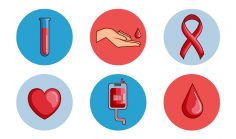Angina + Heart Disease: What You Need to Know

What is Angina?
According to the American Heart Association, angina is chest pain or discomfort that occurs when your heart muscle does not get enough oxygen-rich blood. Angina is not a disease in itself but rather a warning sign for cardiovascular disease.

Stable Angina vs Unstable Angina
Stable Angina, also known as angina pectoris, is chest pain or discomfort that happens in recurring short episodes (usually five minutes or less in duration). It can typically be treated by rest or medicine. Unstable angina is unexpected chest pain or discomfort that lasts longer than five minutes and can worsen with time. It typically occurs while resting or sleeping, and should be treated as an emergency as it could be a sign of a heart attack.

What Puts Me at Risk for Angina?
Certain risk factors increase your risk of developing angina. The American Heart Association lists the following as the major risk factors for angina: high cholesterol, high blood pressure, smoking, diabetes, overweight or obesity, metabolic syndrome, inactivity, unhealthy diet, older age (above 45 years for men, above 55 years for women), and family history of heart disease.

Angina May Disguise Itself
Angina is most often described as chest pain or discomfort, but pain can also occur in the shoulders, back, arms, neck, or jaw. Many mistake angina-related pain for indigestion or muscle soreness and never report their symptoms to their doctor. If you think you have experienced any form of angina, talk to your doctor.

Female Angina vs. Male Angina
Angina can present itself differently in men and women. This is because angina is more likely to be a sign of coronary artery disease (CAD) in men and a sign of microvascular disease (MVD) in women. In addition to the chest tightness, discomfort or pressure felt by men with angina, women with angina can experience shortness of breath, nausea, vomiting, or more severe chest pain.

Meditation: A Zen Path to Heart Health
Meditation, a centuries-old practice that seeks to calm the mind and body in order to achieve focus and relaxation, is now endorsed by many leading cardiovascular experts for its heart-healthy benefits. Meditation has been found to decrease the level of stress hormones within the body, thereby lowering blood pressure and decreasing the risk of cardiovascular disease. One study found meditation to decrease the risk of heart attack as much as 48%.

Stepping Towards Heart Health
The heart, like any other muscle, weakens if it is not frequently conditioned. Regular exercise (a recommended daily 30 minutes) helps to strengthen the heart muscle to protect against cardiovascular disease. Regular exercise can also help to control many of the risk factors for heart disease, including high blood pressure, excess body weight, and diabetes.

Lowering Cholesterol With Heart-Healthy Fats
Blood cholesterol levels are indicative of the fat levels within the blood. Excess cholesterol in the blood can cause the fat particles to stick to and “harden” the arteries within the body, leading to cardiovascular disease. Patients can manage cholesterol levels through their diet – by cutting out “bad” fats such as trans fats, red meats, butter, cheese, and ice cream, and substituting in “good” fats such as those found in olive oil, nuts, seeds, avocado, and fish.

Diabetes, Blood Sugar, and Heart Disease
Diabetics are two to four times more likely to have heart disease than non-diabetics, however high blood sugar levels, in both diabetics and non-diabetics, can increase the risk of cardiovascular disease. Excess sugar is especially harmful to the heart when it is refined or added, such as in soft drinks, desserts, candy, and cereals. Opt for fresh fruits or canned fruits without added sugar, which are natural sources of sugar and have plenty of fiber to fill you up.

Hidden Sodium Can Put You at Risk
High blood pressure, a condition that puts 77.9 million Americans at an increased risk for stroke and heart failure, is often caused by excess sodium in the diet. The daily sodium intake recommended by the American Heart Association is 1,500 milligrams or less, but the average American consumes nearly twice that amount (3400 mg). This excess sodium often comes hidden in the form of processed foods, breads, cold cuts, pizza, canned soup, and fast food sandwiches.

Is Aspirin Enough?
Aspirin is one of the most widely available and commonly used medications to protect against heart attacks, but there may be other medications that are more suited to your individual needs. Antiplatelet agents, ACE inhibitors, angiotensin receptor blockers, beta blockers, calcium channel blockers, diuretics, and vasodilators can all work to reduce the likelihood of a heart attack.Talk to your doctor about medications available to help decrease the severity and frequency of your angina.

Heart Attack: When to Dial 911
While some episodes of angina may not require immediate attention, others may be a sign of a heart attack and must be treated as an emergency. If angina occurs as a surprise while resting or sleeping, lasts longer than five minutes, worsens with time, and/or is not improved by medicine or rest, call 911 immediately. This may be a sign of a heart attack.










